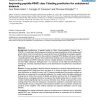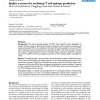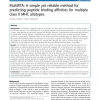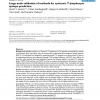15 search results - page 1 / 3 » Predicting MHC class I epitopes in large datasets |
BMCBI
2010
13 years 5 months ago
2010
Background: Experimental screening of large sets of peptides with respect to their MHC binding capabilities is still very demanding due to the large number of possible peptide seq...
BMCBI
2008
13 years 5 months ago
2008
Background: Establishment of peptide binding to Major Histocompatibility Complex class I (MHCI) is a crucial step in the development of subunit vaccines and prediction of such bin...
BMCBI
2006
13 years 4 months ago
2006
Background: The main processing pathway for MHC class I ligands involves degradation of proteins by the proteasome, followed by transport of products by the transporter associated...
BMCBI
2010
13 years 5 months ago
2010
Background: The binding of peptide fragments of antigens to class II MHC is a crucial step in initiating a helper T cell immune response. The identification of such peptide epitop...
BMCBI
2007
13 years 4 months ago
2007
Background: Reliable predictions of Cytotoxic T lymphocyte (CTL) epitopes are essential for rational vaccine design. Most importantly, they can minimize the experimental effort ne...




